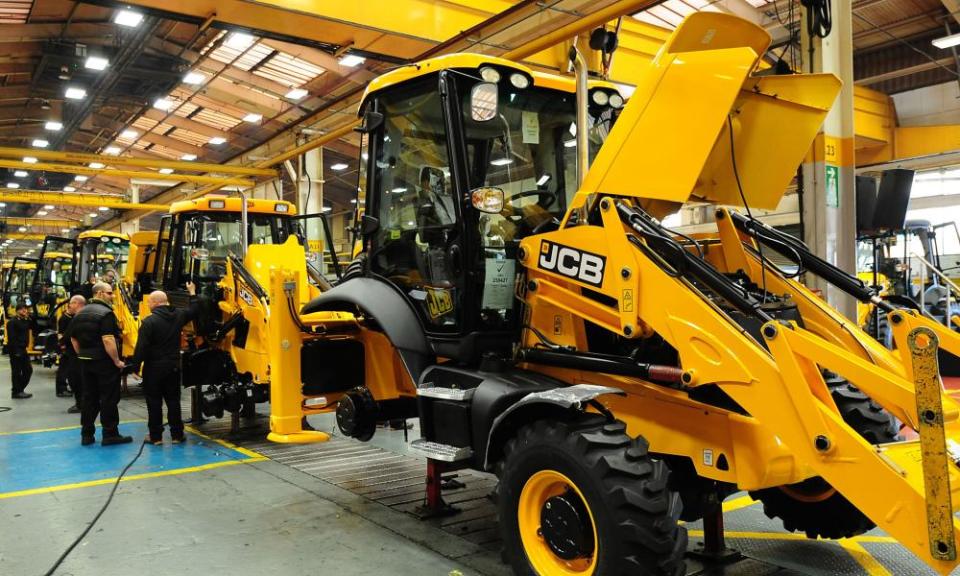Businesses worldwide count cost of coronavirus outbreak

JCB, the British digger maker, has cut working hours and suspended overtime for 4,000 UK employees after the coronavirus outbreak prompted a shortage in parts coming from China.
Factory workers will work a 34-hour week until the disruption ends, although they will still be paid for a 39-hour week and will work them back later in the year.
The majority of the employees affected are based in Staffordshire factories, including its Rocester headquarters, as well as plants in Wrexham and Derbyshire.
Related: How coronavirus is affecting the global economy
Explaining the move, JCB’s chief operating officer, Mark Turner, said: “More than 25% of JCB’s suppliers in China remain closed and those that have reopened are working at reduced capacity and are struggling to make shipments.
“It is therefore clear that the inbound supply of certain components from Chinese partners will be disrupted in the coming weeks as they seek to replenish their stocks.”
JCB’s decision came as companies around the world counted the mounting cost of disruption caused by the coronavirus, which has been named Covid-19. The virus has killed more than 1,370 people and led to much of China’s economy grinding to a halt.
The boss of China’s biggest listed company, Alibaba, described the coronavirus outbreak as a “black swan” event that could have a significant economic impact.
Daniel Zhang, the chief executive, said the outbreak would present significant near-term challenges for Alibaba, with many of the merchants who use its platform unable to return to work.
So far 24 airlines have cancelled flights to and from China. They include British Airways, Air France, and Dutch airline KLM, which axed flights through much of March. In the US, American Airlines and Delta halted flights until the end of April, as did the Spanish flag carrier Iberia.
Asian and Middle Eastern airlines were also heavily affected. Emirates and Etihad are among at least 16 to scrap some routes to China.
Makers of products for Chinese consumers have also taken a hit, with shops and entertainment venues across the country closed by quarantine conditions.
The World Health Organization is recommending that people take simple precautions to reduce exposure to and transmission of the Wuhan coronavirus, for which there is no specific cure or vaccine.
The UN agency advises people to:
Frequently wash their hands with an alcohol-based hand rub or warm water and soap
Cover their mouth and nose with a flexed elbow or tissue when sneezing or coughing
Avoid close contact with anyone who has a fever or cough
Seek early medical help if they have a fever, cough and difficulty breathing, and share their travel history with healthcare providers
Avoid direct, unprotected contact with live animals and surfaces in contact with animals when visiting live markets in affected areas
Avoid eating raw or undercooked animal products and exercise care when handling raw meat, milk or animal organs to avoid cross-contamination with uncooked foods.
Despite a surge in sales of face masks in the aftermath of the outbreak of the coronavirus outbreak, experts are divided over whether they can prevent transmission and infection. There is some evidence to suggest that masks can help prevent hand-to-mouth transmissions, given the large number of times people touch their faces. The consensus appears to be that wearing a mask can limit – but not eliminate – the risks, provided they are used correctly.
The Foreign and Commonwealth Office has advised UK nationals to leave China where possible. It is also warning that travellers from Hong Kong, Japan, Macau, Malaysia, Republic of Korea, Singapore, Taiwan and Thailand who develop symptoms of cough or fever or shortness of breath within 14 days of returning the UK should contact the NHS by phone.
The French spirits maker Pernod Ricard said profit growth would be slower than previously expected for the year to 30 June. Analysts said the effects would likely be costly, albeit transitory.
“Nightclubs and bars are all closed in China ,and those bars and restaurants that are not closed are empty,” said Alexandre Ricard, the founding family scion who serves as chief executive, according to Reuters.
Ralph Lauren, the US fashion brand, said the outbreak would cost it between $55m and $70m in lost sales. Two-thirds of its stores on the Chinese mainland had been closed for the past week.
Disruption to the company’s supply chain could have a knock-on impact on orders around the world in the first three months of the year, it said.
The EU said the virus was “a source of mounting concern” and a key downside risk to global growth, in a forecast published on Thursday.
The downgraded expectations, particularly for the fast-growing Chinese economy, have dented oil prices. Futures prices for Brent crude oil hit their lowest point since December 2018 on Monday, at $53.11. However, the North Sea benchmark rallied above $56 per barrel on Thursday as oil producers considered cutting production further to sustain prices.
The International Energy Agency expects demand for oil to fall by 435,000 barrels per day for the first three months of the year compared with the last. That would represent the first quarterly contraction since the financial crisis rocked the world economy more than a decade ago.
The influential agency cut its forecast for 2020 oil demand growth by almost a third, to 825,000 barrels per day, which would be the lowest level of growth since 2011.
“There is already a major slowdown in oil consumption and the wider economy in China,” the IEA’s report says.

 Yahoo Finance
Yahoo Finance 